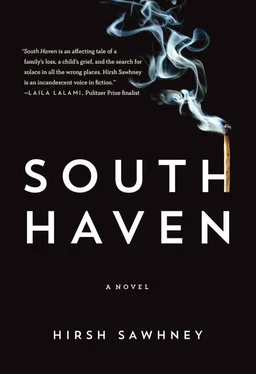* * *
Ms. Farber started complaining that the boys were spending too much time in front of the television. She gave Siddharth a pair of Marc’s old ice skates and began ferrying them to Foster Pond, which was on the border of Woodford and South Haven. Siddharth had never skated before, so Marc had to teach him.
During their first day on the ice, Marc skated backward and pulled him from one end of the pond to the other with a hockey stick. They did this for twenty minutes, then lit a fire in the woods and shared a cigar. On their second day, Siddharth managed to skate into his turns, crossing one foot over the other. Marc told him he was bending his ankles, and that ankle-benders were girls. By their third day, Siddharth had learned how to skate backward, and Marc clapped for him. “Atta girl,” he said, sticking his fingers into his mouth and whistling.
“Screw you,” said Siddharth, but he was smiling; he knew that Marc wasn’t serious.
Marc was still grounded for what he had done to the mailbox, and he would remain grounded until the summer, so the boys’ Foster Pond trips were often an excuse for him to get around the rules of his punishment and meet up with a Woodford eighth grader named Dinetta Luciani. Dinetta always showed up with her best friend, Liza Kim. The girls wore miniskirts and stockings, even with howling winds and temperatures in the teens. Dinetta’s grandfather owned Luciani Carting, but her father owned a liquor store, and she usually brought a few tiny bottles of vodka or rum. Siddharth only pretended to sip from them. If his father caught him with booze on his breath, his days with Marc would be numbered.
The four kids avoided the main pond, instead heading into the frozen labyrinth of swamps and trees behind it. This area mesmerized Siddharth. It seemed like a portal to a secret world, like the setting of one of his fantasy books. But he knew better than to share such observations out loud. Marc and Dinetta usually seated themselves on a fallen tree trunk and French-kissed the whole time, so Siddharth ended up spending a lot of time with Liza. She told him that junior high was awesome, that even though Marc was only a seventh grader, he was one of the cutest kids in their whole school. She asked Siddharth if he had a girlfriend.
“Used to,” he said. “But we, like, broke up.”
“You’re lying,” said Liza. “I can tell when people are lying.”
“Why would I lie? I even got to first base with her — second, over the shirt.”
“So what was her name then?”
“Sharon,” he said. “Sharon Nagorski.”
Marc later told Siddharth that Liza thought he was cute, but Siddharth said he wasn’t into Orientals.
“Pussy’s pussy,” said Marc. “I’d go for it if I were you.”
“We’ll see,” said Siddharth. He was thrilled that a girl actually liked him, but also petrified. He didn’t know how to kiss. And he would die if she saw his penis, which was probably the smallest dick in the world.
On weekends, fifteen or twenty kids showed up to Foster Pond for pickup hockey games. Everybody had to plunk their sticks in the middle of the ice. One boy would chuck the sticks into two separate piles, and the spot where your stick landed determined which team you were on. Siddharth was the smallest and most inexperienced player, and since nobody thought he was worth defending, he was usually left wide open. If his teammates were in a jam, they’d see him standing all alone and send the puck sailing in his direction. The sight of the approaching puck would make Siddharth want to gag. As soon as it would reach him, he’d smack it as hard as he could at nothing in a particular with his brand-new hockey stick, which was a gift from Marc and his father. Once in a rare while, one of these wild shots actually scored a goal, but most of the time they just went out of bounds, eliciting grumbles and ridicule from the other players. One of these slap shots accidentally pelted a tenth grade football player named Dennis Bolzano, and Dennis told Siddharth to watch it.
That same afternoon, another one of Siddharth’s frantic shots hit Dennis in the groin, and Dennis started cursing. He flew over to Siddharth, hooking his stick into the blade of his skate and yanking him onto the ice. Siddharth fell hard on his shoulder, but he didn’t care about the pain. He just hoped that nobody had seen what had happened. Marc, who was playing goalie, skated over and helped him up. Marc then jetted over to Dennis and shoved him hard from behind.
Dennis stumbled but didn’t fall, and when he turned around, he looked pissed. He was wearing hockey gloves, which he cast onto the ice the way the pros did on television.
“Hit me,” said Marc, raising his stick in the air. “Hit me, and I’ll crack your fucking skull.”
Siddharth was drenched in sweat despite the numbing cold. He wanted Marc to do it.
“Fucking midgets,” said Dennis, grabbing his gloves and skating away.
Siddharth laughed. He felt safe with Marc, like nothing bad could happen when he was around. He hated to admit it, but he would choose hockey with Marc over baseball with Arjun any day of the week.
* * *
After his evening classes, Mohan Lal made it to Ms. Farber’s by eight thirty. She microwaved him a plate of food, and as he ate, Siddharth and Marc would devour bowls of frozen yogurt alongside him. Ms. Farber usually steered the conversation toward her favorite topics, like “self-actualization” or “everyday enlightenment,” or the adults discussed books they had exchanged. Ms. Farber had given Mohan Lal a paperback by Ram Das, who Siddharth discovered was actually American. Mohan Lal had lent her something called The Autobiography of a Yogi , a book that particularly bothered Siddharth, for the holy man on its cover was too feminine and foreign-looking.
Siddharth liked it best when Ms. Farber swore them to secrecy and provided updates on her clients’ progress, making sure not to use their actual names. By the end of February, three clients were attending regular sessions at her clinical psychology practice. All of them had been referred to her by the rabbi at her new synagogue. There was the Polish woman who had lost most of her family in the Holocaust. She’d immigrated to America when she was six and later went to a Methodist university, but she dropped out to marry one of her professors. Her husband turned out to be an abusive alcoholic, and they eventually got divorced. Now she was dating a Jewish lawyer with a heroin problem.
“The truth is,” said Mohan Lal one night, “most people lack the capacity for introspection. For most people, genuine change is an impossibility.”
“Hell yeah,” said Marc. “Once a loser, always a loser.”
“That’s awful,” said Ms. Farber. “I actually don’t think there’s a grain of truth to what you’re saying. I mean, if she can get to the bottom of that trauma — if she can articulate it — then she can definitely stop being so. . so. .”
“So retarted?” said Marc.
“So self-destructive,” said Ms. Farber.
“Well, I think people can change,” said Siddharth. “Look at Arjun.”
“How interesting, honey,” said Ms. Farber. “And just how did your brother change?”
“Just look at the way he dresses. First it was heavy metal T-shirts, and then everything had to be preppie. Now all his clothes are torn up. He’ll only wear a shirt if it’s made of—”
“Let me tell you about the problem with the West,” Mohan Lal cut in. “The Western mind always wants to blame everything on the past — the past and the parents.”
Siddharth shot his father a look, partially because Mohan Lal had interrupted him, but mainly because he didn’t want him to go off on some ridiculous tangent. If Mohan Lal got political, everything could go to shit.
Читать дальше












